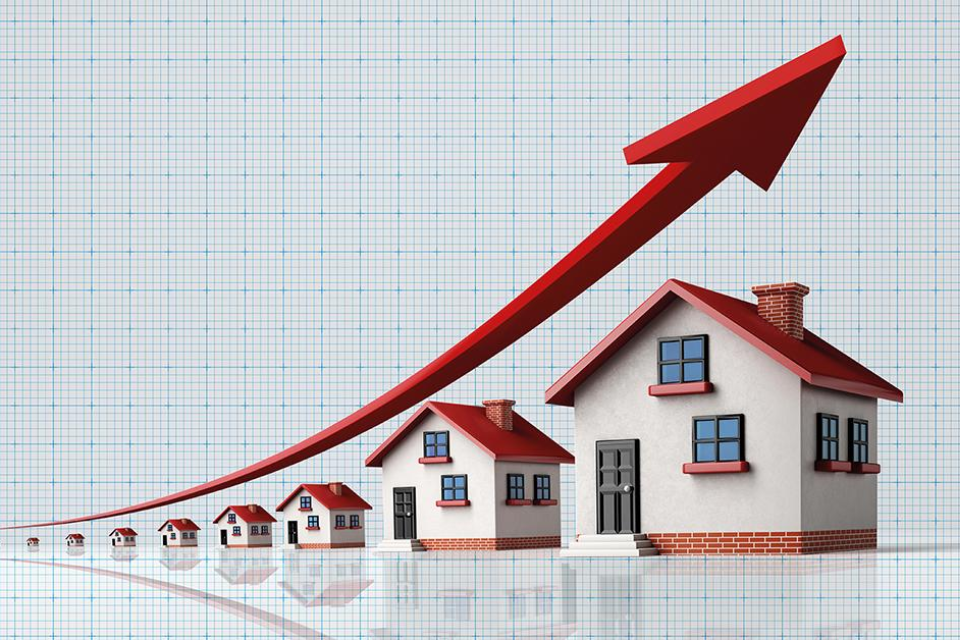Although the rate of appreciation can vary and fluctuate from state to state, home values typically rise with time. Home values have significantly increased recently, with a countrywide gain of nearly 18% in the previous year alone.
Owning a home not only provides a place to live but also makes a smart long-term investment. Due to your consistent mortgage payments, you build equity, which is the value of your home less any outstanding debt. Property appreciation, which can boost your equity and possibly provide financial security, is the word used to describe the increase in value of your property over time.
In this article, we’ll examine the factors that influence house value growth, the average annual growth rate, and the benefits of home appreciation.
Why should my house be valuable?
The potential open market sale price of your home establishes its value. The local real estate market, the state of the property, and any upgrades or additions you make can all affect its value over time.
Home appreciation happens when local housing costs grow, increasing the value of your house. The increase in value may increase your equity. Home equity is the difference between the outstanding debt on your mortgage and the home’s current worth. Equity can rise through house appreciation in addition to monthly mortgage payments.
It’s crucial to keep in mind that property appreciation is not a given and can be impacted by changes in the market. There could be times when house values depreciate, potentially lowering your equity. If you intend to sell your home or refinance your mortgage, this could cause problems.
Average annual growth in home prices
According to the Federal Housing Finance Agency, national home values have significantly increased by 18.8% over the previous year. However, historical statistics show that, depending on the time period examined, annual home price increases typically vary from 4.3% to 7.7%. Data at the state level also reveal variations in home appreciation rates, with Florida’s home prices rising by 30% while North Dakota’s only growing by 10%.
Home values have steadily increased since 1940, quadrupling in value even after accounting for inflation, according to long-term trends. The rates of appreciation have varied by decade, with the 1970s seeing the biggest growth at 43% and the 1980s seeing the lowest at 8%. Home values decreased as a result of the Great Recession, which lasted from 2007 to 2010.
Factors That Affect Home Appreciation
Average house appreciation rates offer a general picture, but individual property value increases depend on a number of variables outside of market patterns. These elements consist of:
Place
Accelerated appreciation rates may be influenced by desirable neighborhoods, close proximity to educational institutions, waterfront vistas, and ease of access to business districts.
Demand and Supply
Home prices can rise more quickly in a region with high demand and a shortage of housing options.
Age and Health
If prospective purchasers believe that major repairs or improvements are necessary, older homes may appreciate more slowly or even depreciate.
Updates and upgrades
Homes that receive upgrades, renovations, or routine upkeep typically appreciate more quickly than those that don’t.
Similar Sales
You can estimate your home’s potential for appreciation by evaluating its worth in relation to other homes of comparable size, location, style, and age. Comparable residences with higher sale prices have appreciated in value.
Making Your Home More Valuable
Even though house value increases organically, you may also increase the value of your home by undertaking remodeling and enhancement initiatives. According to the 2022 Remodeling Cost vs. Value report, a simple mid-range kitchen renovation can increase a home’s value by over $20,000, for example. A new asphalt shingle roof can boost the value of your house by over $19,000.
Remember that the increased value cannot always reflect the whole cost of upgrades. Usually, just a percentage of a project’s expenditure goes into raising a home’s value. Instead of concentrating exclusively on increasing house value, it’s crucial to give modifications that suit your particular preferences and needs top priority.
Benefits of Appreciating Your Home
The advantages of home appreciation include the following:
1. Boosted Equity
Your equity can be greatly increased by home appreciation, creating a valuable financial asset that can be put to many different uses.
2. Potential for Borrowing
With enough home equity, you might think about taking out a home equity loan or a home equity line of credit (HELOC) to pay for renovations, debt relief, or unforeseen needs.
To minimize the danger of potential foreclosure associated with home equity loans and HELOCs, it’s critical to manage your home equity properly and make timely payments.
Conclusion
Therefore, being aware of property appreciation enables homeowners to see the prospective development of their most valuable possession. While typical annual house value increases to give a basic notion of appreciation rates, unique factors like location, supply and demand, home condition, and upgrades play important roles in determining the appreciation of a particular property. You can gain from the greater equity and financial flexibility given by home appreciation by concentrating on responsible homeownership and strategic upgrades.
